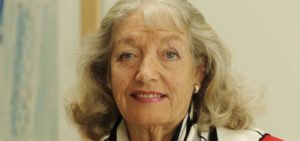
This May 21st, the world lost an extraordinary human being. The progressive economic activist Hazel Henderson was born in Bristol, Somerset, in the United Kingdom but spent most of her years as a naturalized American citizen, more recently based in St Augustine, Florida.
Hazel Henderson was 89 and still a cultural force of great impact through Ethical Markets Media, the powerful net presence she founded.
I first became a huge Hazel Henderson fan in 1981, when her book, The Politics of the Solar Age was published. This book had a massive impact on my worldview. I learned from Hazel that humanity’s long-entrenched dependence on carbon-based fossil fuels was an economic and cultural dead-end.
Hazel was an ardent champion of the emerging green energy era, powered largely by the massive amount of energy delivered to our Earth every passing moment by the Sun at the center of our galaxy.
Hazel was a committed advocate for clean, green, sustainable technologies through her nine books, hundreds of published articles, and passionate advocacy at “Ethical Markets Media”. She is widely considered as the founder of the socially responsible investment industry. Hazel relished being a disruptive influence on the world stage. She had multiple honorary doctorate degrees and spent much of her life defined as a committed futurist.
In 1964, out of concern for her young daughter’s health, Hazel Henderson co-founded Citizens for Clean Air in New York City. In 1967, The New York Medical Society named her Citizen of the Year for her powerful advocacy. In the 1970s, the Public Relations Society of America characterized Hazel Henderson as “the most dangerous woman in America”.
Hazel Henderson was also an honorary member of the Club of Rome and a Fellow of the Royal Society of Arts.
Hazel Henderson declared “no confidence” in traditional economics after learning that it gave no value to such delineators as human health, clean water and clean air, and the safety of the food we eat. She had no use for economics that externalized or discounted costs related to pollution and resource depletion. She saw economics as a form of politics rather than science.
Hazel once said, “If we can recognize that change and uncertainty are basic principles, we can greet the future and the transformation we are undergoing with the understanding that we do not know enough to be pessimistic”.
I consider it a great privilege to have been personally acquainted with Hazel. She was a massive influence on my own book, The Hydrogen Age, which was an extension of what she illuminated in her book, The Politics of the Solar Age.
Just two years ago, I shared a Stanford MAHB Dialogue with Hazel Henderson in which she offered a perspective on the solar age and her brand of green economics that is now rapidly emerging.
Our world has been substantially impacted by Hazel Henderson’s influence. The pollution-free, sustainable economics era now emerging on Earth comes in no small part because of Hazel Henderson’s vision presented in her The Politics of the Solar Age.
